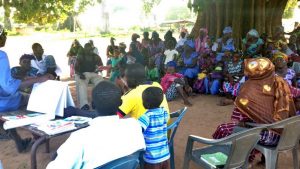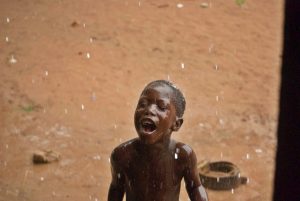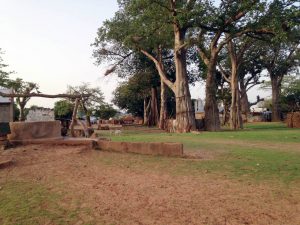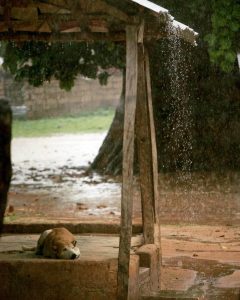This project is made possible through the partnership of WATER CHARITY and the NATIONAL PEACE CORPS ASSOCIATION. ![]()
 Location
Location
Chissey Majaw, Jokadu, North Bank, The Gambia
Community Description
Chissey Majaw is located in the Jokadu region of The Gambia’s North Bank. The village is ethnically Wolof, along with Fula and Bambara constituents. The village has 54 compounds with a population of approximately 1,100.
Farming is the main source of income for all compounds, with groundnut being the main cash crop and coos being the staple crop. In The Gambia, the farming season extends from June to January, with all members of the household being extensively involved in all stages of agriculture from preparing the fields to harvesting. The majority of farmers employ subsistence farming methods with little or no modern equipment and the scant surplus of crops that is not used for sustenance is usually sold for a small profit.
Chissey Majaw has a lower basic school, which consists of EDC (Early Child Development) through grades six. The lower basic school serves Chissey Majaw as well as the neighboring villages of Tallen and Drammeh Joka.
 Problem Addressed
Problem Addressed
Presently, Chissey Majaw’s sole source of clean water is a borehole and tap system. Taps are placed at strategic points throughout the village, providing all compounds with a nearby water source. However, the borehole’s functionality is a problem. Last year, due to a variety of reasons, the borehole was only functional approximately 60% of the time. Especially during the dry season, the borehole tends to be problematic.
With a less than the optimum supply of water, lines and waits for the tap become extremely long. Most compounds resort to drawing water from the village’s only other source of water, the open well. This decreased supply of water has the largest effect on the female population of Chissey Majaw. Since fetching water is primarily a female chore, many girls spend an inordinate amount of time waiting to fetch water – time that could be better used at school, studying, or performing other chores.
Furthermore, the increased use of the open well has increased the frequency of diarrhea in the village. Out of 26 compounds surveyed, 23 reported that their children suffered from diarrhea in the past three months. Reports from the local health post confirm that diarrhea is the most prominent affliction in the village.
Other than the borehole, Chissey Majaw has two non-functioning F.R.G.-era hand pumps. In the past, the village has been vigilant in its maintenance of the pumps. However, the pumps were malfunctioning at a rate that placed a large economic burden on the village. Furthermore, the provider of the F.R.G. pumps went out of business, making parts for repair difficult to find. The village has done its best to remedy the water situation. However, it can no longer find the necessary parts to fix the existing hand pumps.
 Project Description
Project Description
This project is to install two new pumps in the village. This project will contract with Swe-Gam, a company with extensive water project experience, to replace the two outdated handpumps with the more modern BluePumps. A representative of Swe-Gam visited the village and surveyed the wells. Water Charity has extensive experience in The Gambia, working with Swe-Gam on the installation of BluePumps.
Both wells are 36 meters deep and have their own aquifers – separate from each other and the borehole. It will not be necessary to re-dig the wells for the pumps; the contractor will simply replace the machinery, including pipes and pumping mechanisms, with the Blue Pump machinery.
The Peace Corps Volunteer (PCV) and his counterpart will facilitate a water committee training held by the neighboring village of Fas Omar Saho. 6 community members will be chosen to form Chissey Majaw’s water committee and receive training from select committee members of Fas Omar Saho. Fas Omar Saho is a neighboring village whose water committee has been noted for its efficiency and production – a model for water management. Chissey Majaw already has a fund for maintaining its borehole. However, this training will educate its water committee on incorporating the BluePumps into its water management methodology. The goal of this training is to strengthen the community’s water management capacity for ensuring the sustainability of the village’s clean water.
Upon completion of construction, PCV and counterpart will hold a training teaching Village Support Group members proper clean water practices.
 Project Impact
Project Impact
1,100 people will benefit from the project.
Peace Corps Volunteer Directing Project
K. Hamzah Ahmed
Monitoring and Maintenance
The PCV and counterpart will use the project logic model of intervention to monitor the implementation of the project activities and to track project performance. Similarly, the model will be used to evaluate the immediate outcomes (impacts) of the project as well as the long-term impact of whether the intervention has achieved the expected objectives and goals of the project.
PCV and its counterpart will use Peace Corps water, sanitation, and hygiene data collection tools to collect the relevant figures during the project implementation. The sustainability of a clean water supply is the goal of this project.
A sub-committee for water system management was established under the village development committee and shall be responsible for monitoring the operations of the newly constructed BluePumps and the existing water supply system. The management team will be trained on basic maintenance procedures to reduce the cost of the routine maintenance of the water system (borehole system and hand pumps).
There is already a system maintenance fund in place, with every compound head contributing 300 dalasi yearly and every married couple contributing 100 dalasi yearly. By following this model, the village has already accrued 60,000 dalasi for the maintenance of its water system.
The PCV and the counterpart will further train the water committee members on basic financial administration and management procedures to ensure financial records are up to date and funds are available to pay for routine maintenance costs at all times
Let Girls Learn
This project qualifies as a Let Girls Learn project because the goal is to reduce the spread of infectious diseases through the utilization of clean water, improved hand hygiene, and sanitation. Project objectives include:
(1) Improved access to clean and quality water sources to the current borehole water system by creating a reliable, clean source of water, accessible throughout the year for the village,
(2) Improved access to quality education for girls through an improved water facility, and
(3) Improved the lower basic school’s garden projects through improved access to water to increase additional nutrition vegetables for the children.
Fundraising Target
$3,900
Funds raised in excess of the project amount will be allocated to other projects in the country.
Donations Collected to Date
$3,900
Dollar Amount Needed
$0 – This project has been funded through the generosity of Thomas Black.
Additional donations will be allocated to other projects in The Gambia.